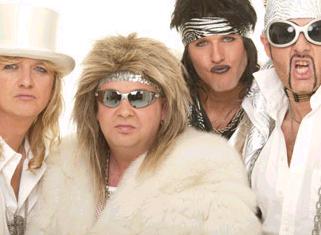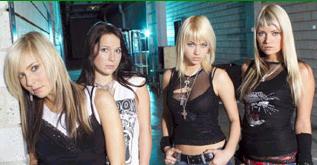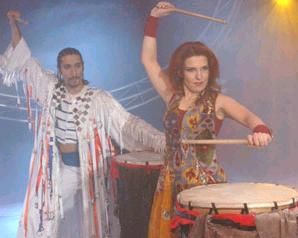
Candida Martinelli's Italophile Site

Main
Page This family-friendly site celebrates Italian culture for the enjoyment of children and
adults. Site-Overview
Winning 2nd place in 2011 with this jazz number, a popular favorite that
lost out to a very boring, indecipherable, derivative number from
scantily clad Azerbaijan. The Swedish singing group Abba won the 'Eurovision Song
Festival' in 1974 with 'Waterloo' which launched them in Europe and
throughout the world. Click on the image to read about their win
and how it is being commemorated thirty years on.
Al Bano and Romina Power, Tyrone Power's daughter by his
Italian wife. They were a hit husband and wife singing duo for
many decades, and technically they both wrote the songs, but most
concede that Al Bano was the real songwriter.
He now has a very strong solo career. They competed
in the 'Eurovision Song Festival' many times, also in the 'San Remo
Song Festival'.
They recorded in many languages and are probably most
famous for the "duck" song, or 'Il ballo di qua qua',
that parents all over the world had to dance with their children by
flapping their elbows with their hands in their armpits. Oh, the
things parents do for their children...
Lyrics for many of their songs My
list of Al Bano CDs at Amazon.com
Toto Cutugno
singing as Toto Cutugno sings best: in the middle of the
audience. Click on the image to visit his official website.
Click here to read the BBC's irreverent report on the outcome of
the 2004
Eurovision contest.
To get a taste of the tone in which the contest is taken, at
least in the U.K., check out this discussion
board. Wogan, who is mentioned often with great
reverence, is the Anglo-Irish presenter who's commentary adds
greatly to the camp-fest that is the Eurovision Song Festival. The irreverent Mr. Terry Wogan I remember one year, after sitting through truckloads of
scantily clad dancers (not even talented enough to be considered
back-up singers) in spandex and chains, Wogan let loose a shout when a
group of performers all in shiny black outfits came on stage, and then
said: "Oh, God, let it be leather!"
BBC presenter and DJ Terry Wogan. Mr. Wogan presents Eurovision on the BBC
but many other nationals watch him too, mainly, it seems, so they can
complain about his irreverence.
Click here to get a sampling of 'Woganisms'.
And click here for the BBC's review of the 2005
Eurovision contest.
Norway's middle-aged Glam-Rockers, Wig Wam, stole the 'camp
prize' this year, in silver spandex style!
Vanilla Ninja, Estonians performing for Switzerland, led the
hoard of 'Christina Aguilera-looking' women.
Here are a few of the hoard from various countries...
Another Greek-gened pin-up this year (2005), Konstandinos
Christoforou for Cyprus. Last year it was Sakis Rouvas from
Greece.
There's a lot of copy-cating with Eurovision, so after last
year's winning leather / drum / and stomping performance by scantily
clad women, this year we were treated to lots of leather,
drums, stomping, and scantily clad women. This image is of
Turkey's entry, and their traditional drums.
And the winner is...
Helena Paparizou, massacring her dancers in just the same way as
her Greek colleague from last year. See...
Must be the same choreographer.
Now for some of the 'winning' outfits for your viewing
pleasure...
Until next year...
Eurovision 2006 - The BBC Report Italians are passionate about their many singer-songwriters, cantautori.
It's for just this reason that Italy no longer participates every
year in the Europe-wide song festival called the Eurovision
Song Festival. Eurovision is an association of European (and
Mediterranean) broadcasters that has recently expanded to include
broadcasters from the new European Union members, plus more countries
to the East. The group includes Turkey, Israel and Russia for example.
Every year they hold a song festival featuring entries from most of
the member countries. Italy won the contest in 1990 when Toto Cutugno sang a song
that was technically entitled Insieme: 1992, a key year for
European integration. The main refrain in the song, actually
this was practically all the lyrics of the song repeated over and over
and over again, was "Unite tonight, Europe". Toto Cutugno stunned the pan-European viewers and commentators by
jumping off the stage and singing as he walked through the audience.
The Italian viewers were not stunned, however, as this is classic
"Cutugno", who did the same thing every Sunday when he
hosted the Domenica In television show. But it did
make him a household name throughout Europe for a few years. This image is from Mr. Cutugno's latest release.
Click here to go to his website. A few years back, when Italy came in a terrible position with a
song and performance by one of their most treasured
singer-songwriters, Enrico Ruggieri, they took their ball and
well home, refusing to play with Eurovision any more.
They accused their fellow broadcasters of catering to the masses' lack
of musical sophistication and of politicized voting. While Italy was ridiculed at the time for being a poor loser, many
countries have come to agree with the Italian view. What a certain high-level U.S. civil servant has called "Old
Europe", is now convinced that "New Europe" is flooding
the contest with an even lower standard of musicology and an even
more pronounced tendency for politicized voting. (Echoing
paranoiac wide-spread fears for lower standards all around for the
expanded European Union in general, I should add.) After the beginning of the second war in Iraq, the Eurovision
2003 voters placed Britain at the bottom with zero votes and
Turkey won the contest for the first time in history. The next day, all the pundits explained that by voting for the only
Moslem country in Eurovision, and punishing the U.S.'s
strongest alley in the war, the voters probably hoped to ward off
terrorist bombs in Europe. A futile hope, as it turned out. And with Eurovision 2004, the pundits in "Old
Europe" are at it again. Britain and the other "Old
Europe" countries were voted to the bottom of the ranking,
neutral Sweden ended high on the list, and Ukraine won. As for the quality of entries ... well, I'll give you a sampling,
but if you think I'm exaggerating, the BBC
has a site with video and lyrics, so you can see for yourself. Ukraine's entry was a number called "Wild Dance"
that sounded like gibberish chanted more than sung by performers done
up like extras from the TV show "Zena, Warrior Princess".
Not exactly a song to hum on the way to work. Ukraine's winning Eurovision contestants
performing 'Wild Dances' in 'Zena: Warrior Princess' outfits.
They actually broke the stage during rehearsals from their stomping.
And won the competition in 2004.
Greece did well with a number that looked like a Greek
version of Ricky Martin's "She Bangs" that could have been
called "He Bangs" because that's what the Greek version of
Ricky Martin (plus gold chains around his neck) mimicked with his
dancers throughout his performance. Eurovision's Greek contestant for 2004, Sakis
Rouvas, performing 'Shake It', which he did until the dancers could
take no more and collapsed.
Malta produced a "Bollywood" number complete with
electronically created butterflies flitting around the boy (more gold
chains) and girl as they belted out their boy-gets-girl,
boy-loses-girl, boy-gets-girl number. Malta's Eurovision contestants performing their
'Bollywood' number, doing very well in the final placements.
The 2005 event was held in Ukraine, still heady after their
'Orange Revolution' that removed the corrupt post-Soviet regime
and replaced it with the opposition leader, who was poisoned by the
head of state security before the contested elections. To honor the Ukrainian people's courage, many performers and
foreign correspondents wore orange outfits, and there were
plenty of compliments all around. Ukraine built a new performance center to stage the Eurovision
event, and it was indeed beautifully done. And the
performers did not disappoint: it was as campy as always! I provide some images in the left column if you're
interested. And you can visit the BBC
site for videos and more. There have been some interesting aftermaths of Greece's win,
with runners-up Malta and Romania, and the placing at the bottom of
the scoreboard Spain, the U.K., France and Germany. There
have been more 'old Europe' complaints of lower musical standards and
politicized voting. In my humble opinion, I think the issue is another one. Many
years back, 'old Europe' shifted away from national dress,
instruments, performance styles, and even away from singing in their
own language. A generic 'international' style was adopted,
including singing in English. Many of the new Eurovision members, however, are countries
only now experiencing strong nationalistic feelings due to economic
growth and political reawakening. They want to express their
cultures. So in with native costume, instruments,
languages, sounds, styles. 'Old Europe' is too generic to please the people of the 'new
Europe'. And perhaps that's a good thing! Maybe it's
time to go back to the roots... Oh, Italy wasn't there. She chose not to participate
again this year, and is concentrating on her own song festival coming
up, Cansonissima. Ironically, in the meantime, Italy's famous San Remo Song
Festival switched from a jury system to a popular vote, too.
And as happens with popular votes, the popular singer wins, rather
than the best song. Back in the stone-age of the San Remo Festival (it's taken
place for 55 years) they used to have two different singers perform
the same song just to make sure people focused on the song rather
than on the performer. But no more. And every year, people complain about the lowered standard of
songs, performers and performances at San Remo, echoing many of
the criticisms of the other popularly-voted winners of TV talent
contests that are currently big business around the globe. La
vita e' cosi', pace, or that's just how life is, so
live with it, you could say. Democracy has never promised that the best candidate will win, only
that the most popular candidate will win. Popularity relies greatly on presentation and perception, less
on performance, at least for the first election.
Fortunately, incumbents have to live up to a higher standard on the
performance scale when they release their second CD. So it may not be long before Italy returns to the Eurovision
Song Festival and competes once again every year. Al Bano, one of Italy's well-known singer-songwriters
actually competed for Switzerland one year, saying that he was sick of
the low standards of Italian songs and performances. So the
writing is on the wall. San Remo 2004 Marco Masini, the winner of the 54th 'Festival di
San Remo', held in 2004.
San Remo 2005 Maybe the organizers have read this page, because in 2005 they
used a combined jury/public voting system to weed out the worst
entries before the public got to vote for the final winners! The
best of both worlds. Francesco Renga winner of the 55th 'Festival di
San Remo', held in 2005.
The 'Festival di San
Remo' site.
A listing of all
the past winners of the Festival di San Remo.
A site listing
Italy's entries and placing over the years. A list
of Italy's entries with links to lyrics and/or websites for the
performers. That's Neapolitan singer and actor Massimo Ranieri, whom I
correctly picked as the winner of the 'San Remo Song Festival'
one year, to the surprise of my friends, except the Neapolitan ones,
who said that "even a foreigner can hear the superiority of
Neapolitan singers". How sweet.

Eurovision
and San Remo Song Festivals
![]()
Good news: Italy has returned to the Eurovision Song Festival.

































Eurovision Song Festival

Eurovision 2003
Eurovision 2004






Eurovision 2005
San Remo Song Festival



